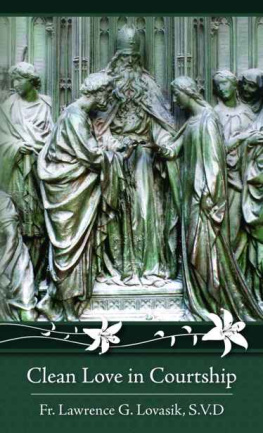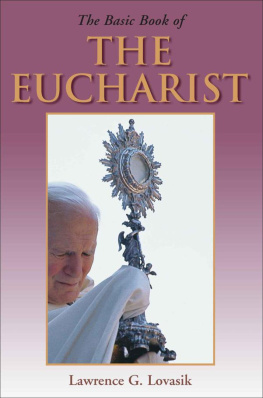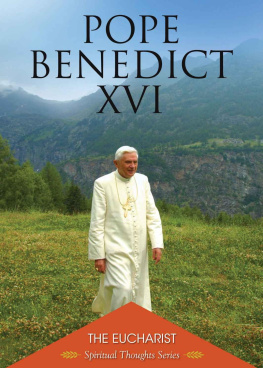Lawrence Lovasik - Basic Book of the Eucharist
Here you can read online Lawrence Lovasik - Basic Book of the Eucharist full text of the book (entire story) in english for free. Download pdf and epub, get meaning, cover and reviews about this ebook. year: 2013, publisher: Sophia Institute Press, genre: Religion. Description of the work, (preface) as well as reviews are available. Best literature library LitArk.com created for fans of good reading and offers a wide selection of genres:
Romance novel
Science fiction
Adventure
Detective
Science
History
Home and family
Prose
Art
Politics
Computer
Non-fiction
Religion
Business
Children
Humor
Choose a favorite category and find really read worthwhile books. Enjoy immersion in the world of imagination, feel the emotions of the characters or learn something new for yourself, make an fascinating discovery.
- Book:Basic Book of the Eucharist
- Author:
- Publisher:Sophia Institute Press
- Genre:
- Year:2013
- Rating:5 / 5
- Favourites:Add to favourites
- Your mark:
- 100
- 1
- 2
- 3
- 4
- 5
Basic Book of the Eucharist: summary, description and annotation
We offer to read an annotation, description, summary or preface (depends on what the author of the book "Basic Book of the Eucharist" wrote himself). If you haven't found the necessary information about the book — write in the comments, we will try to find it.
Basic Book of the Eucharist — read online for free the complete book (whole text) full work
Below is the text of the book, divided by pages. System saving the place of the last page read, allows you to conveniently read the book "Basic Book of the Eucharist" online for free, without having to search again every time where you left off. Put a bookmark, and you can go to the page where you finished reading at any time.
Font size:
Interval:
Bookmark:
The Basic Book of the Eucharist
Reverend Lawrence G. Lovasik
SOPHIA INSTITUTE PRESS
Manchester, New Hampshire
The Basic Book of the Eucharist is an abridged edition of The Eucharist in Catholic Life (New York: The Macmillan Company, 1960) and contains editorial revisions to the original text.
Copyright 1960 Lawrence G. Lovasik; 2001 Raymond L. Lovasik
Biblical quotations are based on the Catholic Edition of the Revised Standard Version of the Bible, Copyright 1965, 1966, by the Division of Christian Education of the National Council of the Churches of Christ in the United States of America. Used by permission.
All rights reserved
Printed in the United States of America
Jacket design by Lorraine Bilodeau
Jacket photograph by Grzegorz Galazka, courtesy of
Inside the Vatican Magazine: 1-800-789-9494
No part of this book may be reproduced, stored in a retrieval system, or transmitted in any form, or by any means, electronic, mechanical, photocopying, or otherwise, without the prior written permission of the publisher, except by a reviewer, who may quote brief passages in a review.
Sophia Institute Press
Box 5284, Manchester, NH 03108
1-800-888-9344
www.SophiaInstitute.com
Imprimi potest:
Raymond J. Weisenberger, S.V.D.
Provincial, Girard, Pennsylvania
Nihil obstat:
Wilfrid J. Nash, Litt.D., Censor Librorum
Imprimatur:
John Mark Gannon, D.D., D.C.L., LL.D.
Archbishop of Erie, Pennsylvania
December 8, 1959
The basic book of the Eucharist / Lawrence G. Lovasik.
p. cm.Abridged ed. of: The Eucharist in Catholic life.
Includes bibliographical references.
ISBN 1-928832-22-9 (pbk. : alk. paper)
1. Lords Supper Catholic Church. 2. Mass. I. Lovasik, Lawrence G. (Lawrence George), 1913- Eucharist in Catholic life. II. Title.BX2215.3 .L68 2001
264.02036 dc2100-053832
Other books from Sophia Institute Press
by the Reverend Lawrence G. Lovasik:
The Hidden Power of Kindness
The Basic Book of Catholic Prayer
The Catholic Family Handbook
To Jesus Christ,
the Divine Word of God Incarnate
and Eternal High Priest,
who said, I am the Bread of Life,
in deepest gratitude for the Sacrifice of the Mass,
Holy Communion, and His Real Presence among us,
through the hands of
Our Lady of the Most Blessed Sacrament,
this book is reverently dedicated
Foreword
The Holy Eucharist is the crown of all Gods achievements. It is the richest, the most mysterious, the most appealing, and the tenderest of all. This sacrament of sacraments gathers into its depths the unsearchable riches of Christ. Into the Eucharist flow the goodness, the wisdom, the power, the mercy, and the generosity of God.
Devotion to the Holy Eucharist, therefore, is surely the greatest means to make you more interior, more Christlike, because the Eucharist is the source from which the graces of Redemption continually flow to mankind.
In a world radio address in 1943, Pope Pius XII said, The thought of the Eucharist is the center of the faith now as it was in the first centuries. Its increase in the Church and its spiritual, vivifying radiation must become more vital and more effective.
These words of the Holy Father point out the purpose of this book namely, that the spiritual influence of the Eucharist may become more vital and more effective in the lives of Catholics.
May Catholics heed the voice of Holy Mother Church and return to the Eucharist-mindedness of the first Christians. May the last will of Jesus be carried out as faithfully today as it was then. Daily Mass with Holy Communion is the Churchs ideal. The altar is the center of the Christ-life the center for the priest who there offers the eucharistic Sacrifice; the center for the faithful who gather in the churches before the altar to strengthen their souls at the Lords Table. The Eucharist is the food of life food of Catholic life, which therefore ought to be a eucharistic life.
I entrust these pages to the loving care of Our Lady of the Most Blessed Sacrament.
Father Lawrence G. Lovasik
Feast of Christ the King
Divine Word Seminary
Girard, Pennsylvania
Part One
Christs Real Presence in the Eucharist
Chapter One

Recognize Christs Presence in the Eucharist
Jesus proposed the doctrine of the Holy Eucharist to His disciples a full year before He died. The sixth chapter of St. Johns Gospel is concerned primarily with Christs preparation of His disciples for the institution of the Holy Eucharist. The promise of the Eucharist is stated clearly.
The morning after Jesus had miraculously fed the multitude, the people came to Him again. They hoped that He would repeat His miracle and again satisfy their hunger. He told them, You seek me, not because you saw signs, but because you ate your fill of the loaves.
Then He sought to lift their thoughts above earthly nourishment, by speaking to them of spiritual food for the soul. Do not labor for the food which perishes, but for the food which endures to eternal life, which the Son of Man will give to you.
The Jews then asked what they should do to obtain this spiritual food. Jesus taught them that they could obtain it by believing that He was the Messiah and Son of God, whom the Father had sent and who alone could give them this food. They cried out in delight, Lord, give us this bread always. They still thought that this heavenly food was some wondrous bread, something like the manna from Heaven that fed the Israelites in the desert.
Jesus first spoke of Himself as the Bread of Life that the Father had already given the world. He was the Bread of Life that the soul receives by an act of faith. Then Jesus spoke of something in the future, something that He would give. The Bread that Jesus promised was His Flesh. Not the Father, but Jesus Himself would give it to His faithful followers. They would receive it not merely spiritually, that is, by believing in Him as the Messiah and the very Son of God made man, but really and truly, by eating it.
That such is the meaning of Christs words we know also from the way in which He compares this new food with the manna from Heaven that fed the Israelites in the desert. Jesus said, Your fathers ate the manna in the wilderness, and they died. This is the Bread which comes down from Heaven, that a man may eat of it and not die.
He continued, I am the living Bread which came down from Heaven; if any one eats of this Bread, he will live forever; and the Bread which I shall give for the life of the world is my Flesh.
When the Jews argued among themselves, asking, How can this man give us his flesh to eat?
In these words prefaced with Truly, truly, Jesus stresses the repetition of the ideas of flesh and blood, of eating and drinking.
St. John states that many of the people declared that this doctrine was too hard to believe. This is a hard saying; who can listen to it?

Christ instituted the Eucharist
More than a year had passed since Jesus had promised to give us the wondrous living Bread from Heaven. He must suffer and die in order to give us life eternal. But He did not wish to depart from this world without leaving behind a remembrance of His love for us. In His great love for mankind, Jesus found a means to make us all spiritually rich and to remain with us to the end of the world.
Before the enemies of Jesus could take away His life, His love already provided for His presence on earth in a new way by the institution of the Most Holy Sacrament of the Altar: He gave us Himself in the Holy Eucharist.
Next pageFont size:
Interval:
Bookmark:
Similar books «Basic Book of the Eucharist»
Look at similar books to Basic Book of the Eucharist. We have selected literature similar in name and meaning in the hope of providing readers with more options to find new, interesting, not yet read works.
Discussion, reviews of the book Basic Book of the Eucharist and just readers' own opinions. Leave your comments, write what you think about the work, its meaning or the main characters. Specify what exactly you liked and what you didn't like, and why you think so.

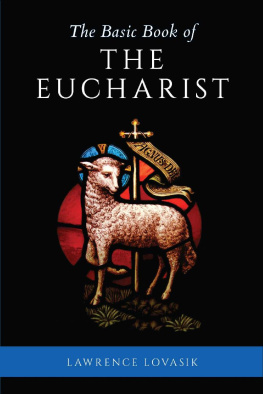
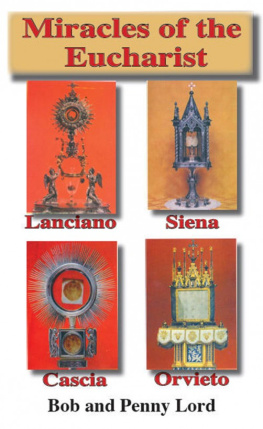

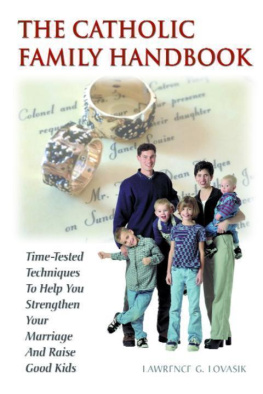
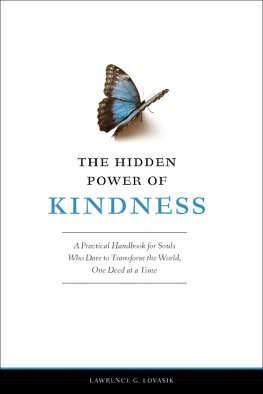
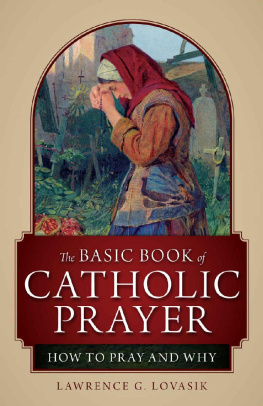
![Lawrence G. Lovasik - The Catholic Family Handbook: Time-Tested Techniques to Help You Strengthen Your Marriage and Raise Good Kids [CONTENT REVIEW: DO NOT PUBLISH]](/uploads/posts/book/259105/thumbs/lawrence-g-lovasik-the-catholic-family-handbook.jpg)
